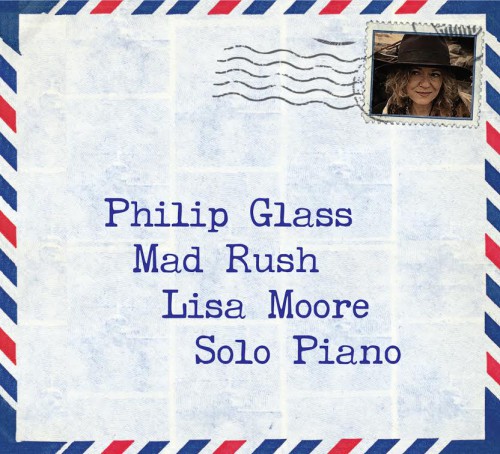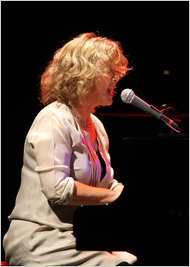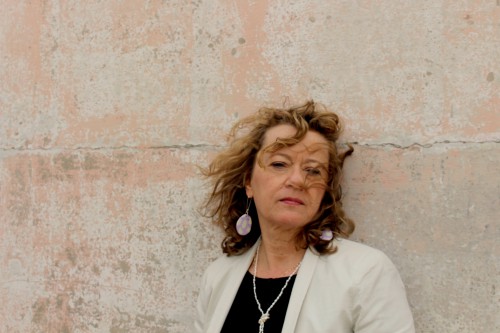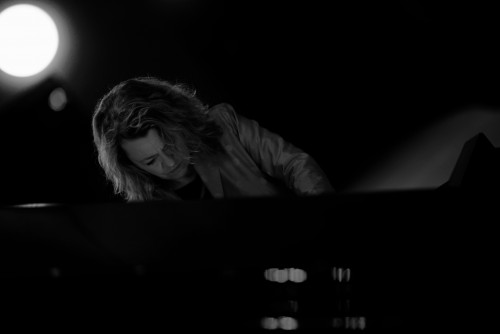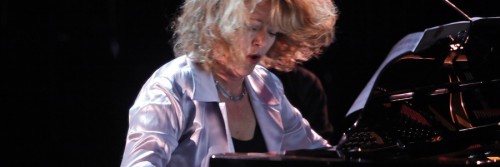
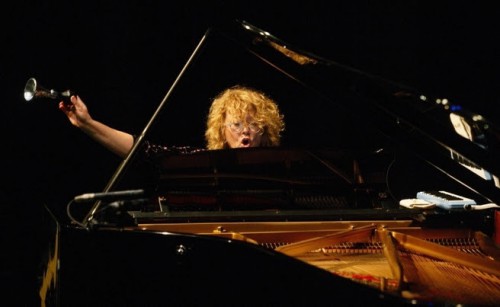
When Lisa Moore performs, the room erupts with energy, lyricism, virtuosity, soul, and drama. She performs entertaining, thematic solo programs at the piano – ideally suited and individually shaped for audiences in concert halls, museums, galleries, festivals, and clubs.
Whether classical or contemporary music – Moore’s concerts often include mixed media such as visual projections, animation, film, electronics, amplification, as well as the use of her voice – singing, speaking, and vocalizing.
Moore’s programs are open designs and flexible in repertoire content.
Please visit the show listings below for details.
The New York Times writes ‘Lisa Moore, an Australian pianist long based in and around New York, has always been a natural, compelling storyteller’, TimeOut New York describes her as ‘the wonderfully lyrical pianist’ and The New Yorker refers to her as ‘New York’s queen of avant-garde piano’. Lisa has released eleven solo commercial albums ranging from Leoš Janáçek to Philip Glass and Elena Kats-Chernin.
For bookings please contact Lisa Moore or Luke Tierney: Tier1Arts – info@tier1arts.com
“The audience took a moment to let it sink in before giving Moore a sustained, hearty ovation.”
“The fiercely poised pianist”
“The New York-based Australian pianist Lisa Moore is a tightrope-walker, a daredevil. She’s the best kind of contemporary classical musician, one so fearsomely game that she inspires composers to offer her their most wildly unplayable ideas. She can play them all.”
“The wonderfully lyrical pianist”
Mad Rush (1979)
Piano Etudes no.5, 7 and 9
Metamorphosis 1-5 (1988)
Satyagraha Act III Conclusion (1980)
arr. Michael Riesman
Closing (1991)
Piano Etude no. 2 (1994)
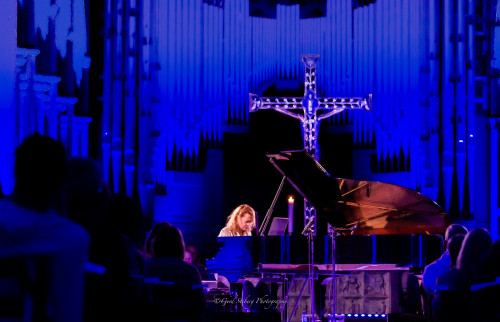
(Duration: 65 minutes)
The ideal music for reverberant, acoustic spaces such as cathedrals, warehouses, train stations, and art galleries.
Music by Philip Glass from Lisa Moore’s 2015 Mad Rush CD (Orange Mountain Music) presenting music with roots in motion pictures, opera, Ghandi, and Buddhism. Mad Rush was written for the Dalai Lama’s dramatic 1981 entrance into St. John the Divine Cathedral, NYC. Metamorphosis I was composed for The Thin Blue Line – a 1988 Errol Morris documentary about Randall Dale Adams who was wrongfully convicted of murdering a police officer and sentenced to death. Metamorphosis II was featured in The Hours – a film based on Virginia Woolf. Satyagraha Act III Conclusion is a 7 minute piano arrangement of the opera’s final scene. “Satyagraha” is Sanskrit for “truth force”. Satyagraha deals with Gandhi’s early years in South Africa and his development of non-violent protest. “Closing” is a solo arrangement of the Music in Twelve Parts finale. Etude no. 2 completes the concert, building rich resonance over a lilting 7/8 – 4/4 rhythm.
Press
“The memory of Moore’s lucid, luminous performance are all I have left to spin into this tale. This performance needs no aid in finding embedding itself into my memory. I’ve heard some dismiss Glass’ work for its overt simplicity, and piano it would seem to reduce further its already minimal content. But Moore’s playing shaded each repeated scale fragment and every basso thump to rang out among the Old Masters in the Toledo Museum of Art’s Great Gallery” — David Dupont, I Care If You Listen
“This album of piano works by Philip Glass has more life and freshness than the composer’s own recordings, themselves still vital. When “Mad Rush” begins to teem, Ms. Moore’s playing seems to escape the shackles of Glass’s processes. In the shifting chords of “Closing,” lines sing as if in Baroque counterpoint, with a fragility and tenderness that recalls Strauss. The five tableaux of “Metamorphosis,” and an arrangement of the end of “Satyagraha,” are scarcely less diaphanous.” — David Allen, The New York Times June ‘15
From Trondheim Norway Aug 2019
“Lisa makes my dice too small”
The piano player visiting Trondheim on Thursday, made the water flow. Not literally, but this was the experience she created.
Words: Maria Veie Sandvik
Water flowed into the cathedral, it was like a dream.
Lisa Moore performed on a podium underneath the main tower, between the northern and southern wing. Despite her considerable international standing, she radiated a humble seriousness. She’s got natural authority, not expressed through posing gestures, but through calmness. Already before her fingers hit the keys, we are focused. The audience sit on chairs that make a lot of sound even by the slightest movement, still the only sound to be heard are occasional suppressed coughs.
The programme of the evening is dedicated to Philip Glass, “the founder of minimalism”, who’s been working cross culturally with icons like Doris Lessing, David Bowie and Woody Allen. Glass himself describes his works as “music with repetitive structure”. In addition to Glass, the audience were treated to “Ishi’s Song” by Martin Bresnick and “Wed” by David Lang.
Swathed in blue light, Moore starts with Glass’ “Etude no. 2”. The first thing that springs to mind is waves, the water flows in, growing in volume and intensity. Even when Moore releases a key, the sound hangs in the air for a long time. It is really, really quiet, not even the squeaking of a chair, only the falling sound of the note.
In the pause before “Metamorphosis I-V”, I move myself to the front row. The light shifts again and gets warmer, from ocean blue to apricot. Are we as an audience being transformed? This year’s Olavsfest impresses, not only through the festival’s choice of artists, but also through how they are presented to the audience. Moore’s playing is ravishing, enchanting, alluring – it’s like we’re all dissolving and become one. And this doesn’t happen through works of dead classic composers, but some that are very much alive. Bresnick is present to hear Moore play «Ishi’s Song». Before Moore sits down by the grand piano, we hear Bresnick tell us about Ishi, who in 1911 was the last survivor of the Yahi tribe of California. Bresnick emphasized how both Ishi and himself had lost the opportunity to speak their native tongue, and described the piece as a requiem for Ishi, but also as a song of healing. What made the piece stand out even further, was that Moore used her own voice, not just the keys on the piano. I got a similar experience from Rossana Mercado-Roja’s performance “Sin Nombre” at the Konst-Tid festival in Åre a few days later. What do you do when you no longer know your native tongue?
Then, the water flows in again, running through Moore’s fingers. It fills the cathedral and lights up the windows. Moore impresses through incredibly precise touches. She’s brilliant, and time and time again I get the feeling she’s gonna leave us – through her sudden and surprising changes, long before the concert ends. Finally she leaves us for real, but we applaud her back and get “Etude no. 7” as a gift in return. With this encore by Glass we also get to hear her hammering the keys, this time with even greater contrast in her approach. It’s like history itself wells out of her piano.
Olavsfest’s festival theme, transformation, turned specific through Moore’s choice of material. Thursday night, Moore gave a voice to both Ishi, Bresnick and countless others.
https://www.adressa.no/pluss/kultur/2019/08/05/Lisa-sprenger-terningen-min-den-blir-for-liten-19635543.ece
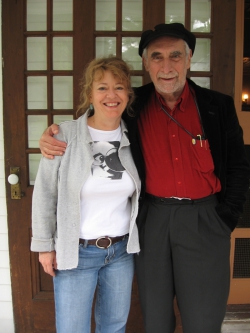 This program presents classic landmark works and a new composition by pianist-composer Frederic Rzewski (1938-2021) from Moore’s new CD ‘no place to go but around’ on Cantaloupe Music (release date: June 24 2022).
This program presents classic landmark works and a new composition by pianist-composer Frederic Rzewski (1938-2021) from Moore’s new CD ‘no place to go but around’ on Cantaloupe Music (release date: June 24 2022).
Program:
To His Coy Mistress (1988) – text by Andrew Marvel
no place to go but around (1974)
Coming Together (1971)*
Amoramaro (2020)
Piano Piece no.4 (1977)
*requires microphone for voice amplification
This project began with a gift.
Martin Bresnick, my life partner, surprised me for my 60thbirthday with a new piece he had commissioned for me, from Frederic Rzewski. Amoramaro – a soulful, strange, almost haunting piece – was written for me, and is dedicated to me, and by a strange fate it is one of the last works Rzewski wrote. Before I could get a chance to play it in public he was gone.
I met Rzewski in 1992, in Amsterdam. I was a founding member of the Bang on a Can All-Stars, and that night we were performing Coming Together, in our own rollicking version – dividing up and trading off the music and the text amongst the sextet. Rzewski was there and he introduced the work from the stage, his unsmiling, strong profile making him both terrifying and yet amusing and lovable. “Western Civilization has been in decline since the Roman Empire” he deliberated into the microphone. The restless audience fell silent.
That same day, a colleague suggested I approach Rzewski and ask him for the score of De Profundis– his new piece for a speaking pianist, based on the letter by an imprisoned Oscar Wilde. He said I should come see him, and a few months later, I drove to Kingston NY, where he was renting a house, to get the score from him. He generously handed it to me, made me a tuna fish sandwich and we sat and talked in the back garden. He said he used to be a communist, but now he was a nihilist. He told me he didn’t believe in copyright, only copyleft and copywrong. “So make a copy of the score and post the original back to me.”
Rzewski’s declamatory, terse way of speaking was a breath of fresh air to me, (familiar to my own family style). He was a one-off. He didn’t seem to care what people thought of him. He was blunt, matter of fact, frustrating, and brilliant. Yet deep down he was a real ‘mensch’ who cared deeply for humanity. His works had strong underlying, or overlying, messages of social justice. He was a bohemian family man, giving most of his meager income to his children and grandchildren. Personally, when I once thought of quitting piano he encouraged me to keep going – he said “why stop playing? Don’t waste your investment, just do other things too.” We always got along. I worked with him closely on De Profundis and To His Coy Mistress. He said “the playing’s always fine Lisa, but go further to exaggerate the words – you have to be the crazy woman in the attic.”
I have dined out on many of Rzewski’s lines. “The so-called field of contemporary music” is one of his phrases I like to use because it so encapsulates our niche-famous status in this boutique field of new music. He could be outspoken, contrarian, outlandish, and opinionated, and yet humble and surprised, even puzzled, as to why the world found him difficult. Neither of us could win teaching jobs, and once, commiserating over lunch, he said “it’s because we’re both terrorists, Lisa.”
Once we were on a NYC ‘gig’ together for twenty-one pianos conducted by a man who only spoke Italian. Things were getting lost in translation. Rzewski was the only one who could translate for the other twenty of us. We asked him for help. But after a long chat with the conductor, Rzewski turned to us and said “you’re on your own.”
pic (by Martin Bresnick) of Lisa Moore and Frederic Rzewski at Yale-Norfolk Festival 2010
Moore’s Tall Poppies program includes works by leading Australian composers
Kate Neal – Commuter Variations*, Novel Instrument
Kate Moore – Sliabh Beagh*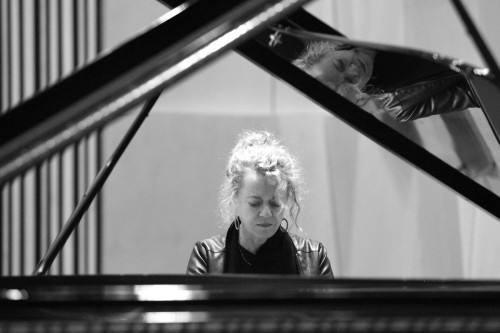
Brett Dean – Equality and Prayer
Erik Griswold – Danny Boy adrift in the rising tide*
Carl Vine – Five Bagatelles
Elena Kats-Chernin – Sonata Lost and Found*
*composed for Lisa Moore
From Lisa’s 2019 Sydney Symphony Solo Piano Series program – a beautiful blend of classical and classic contemporary work.
Etude no 2 (1994) Philip Glass (b.1937)
In the Mists (1912) Leoš Janáček (1854-1928)
Sonata in E flat Major Op.31 no.3 “The Hunt” (1802) Ludwig van Beethoven (1770-1827)
intermission
Waldscenen Op.82 (1851) Robert Schumann (1810-1856)
Ishi’s Song (2012) Martin Bresnick (b.1946)
Piano Piece no.4 (1979) Frederic Rzewski (b.1938)
The (Global) Village Piano

In times of war and dislocation A Global Village Piano brings us together, connecting our lives with music from around the world.
Program:
Sonata Lost and Found (20′) by Elena Kats-Chernin (Russian-Australian)**
Bagatelles Opus 1 (15′) by Valentin Silvestrov (Ukrainian)
Intimate Impressions (21′) by Federico Mompou (Spanish)
Commuter Variations* (19′) by Kate Neal – with animation projections by Sal Cooper (Australian)**
De Profundis for speaking pianist (25′) by Frederic Rzewski (Polish-American) with text by Oscar Wilde (Irish)
**Works commissioned by Lisa Moore
Technical requirements: sound and visual elements required:
Neal: screen, projector, black out
Rzewski: vocal amplification/microphone.
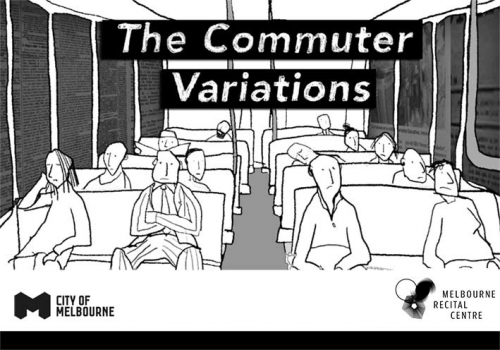 The Commuter Variations
The Commuter Variations
Lisa Moore, piano & voice
This collection of new and recent music explores the piano combined with animation, foley, film, text, song, and minor histrionics – gently constructed around motifs of movement and place. This concert especially celebrates the artistic partnership of the animation artist Sal Cooper and composer Kate Neal. Their collaborative projects have produced whimsical, subtle, and startling performance works. Their The Commuter Variations* explores the quirks of daily routes and routines.
Watch the concert premiere of The Commuter Variations here on youtube, from Melbourne Recital Centre, Aug 7th, 2019
Program:
Mayke Nas – Cleaning Instructions
Sal Cooper/Kate Neal – Novel Instrument
Missy Mazzoli – Orizzonte
Gyorgy Ligeti – Arc-en-Ciel
David Lang – wed (animation by Isabela dos Santos)
Martin Bresnick – Bundists (Gyorgy, Robert and me)
Erik Griswold – Danny Boy adrift in the rising tide
Sal Cooper/Kate Neal – The Commuter Variations
Cooper/Neal’s The Commuter Variations was commissioned by Music Makers Melbourne Recital Center for the venue’s 10th Anniversary.*
- “Artistic Director of Melbourne Recital Centre Marshall Maguire writes: “In 2019, Melbourne Recital commissioned 10 new works for our 10th anniversary. Our intention was to bring artists and audiences together in a celebration of music across a range of styles and genres. And we were delighted that Sal Cooper and Kate Neal were able to create the whimsical, fabulous, thought provoking and beautiful The Commuter Variations for our birthday. Bringing together live performance from the virtuosic Lisa Moore, animation, and a new score, was one of the best gifts we’ve had this year. It was a pleasure to work with all three artists on this project, and I know it will have a rich and long life in concert venues around the world.”
Commuter Variations image by Sal Cooper
Little Room – Exiles – an Irish-Australian pianodrama
Exiles is a performance-art show (and ongoing commissioning project) presenting screened animation and dramatic works for a solo pianist who plays, speaks, sings and does minor histrionics.
The subject is the search for our roots, and within that: distance, estrangement, immigration, travel, place, and change.
The concert features commissioned works composed by Irish-Australian composers – Kate Moore, Kate Neal/Sal Cooper (animation), Erik Griswold, and William Gardiner (the latter with text adapted by Lisa Moore, drawn from poems, novels, diaries and letters). Ambient sound designed by the Australian composer William Gardiner envelops the space between works. This program also features Stainless Staining by Irish composer Donnacha Dennehy (also commissioned by Lisa and featured on her Stainless Staining Cantaloupe CD).
The focal point is De Profundis – a 30 minute dramatic oratorio with music composed and text adapted by Frederic Rzewski from original text by Irish writer Oscar Wilde (excerpted from his 1895 letter “De Profundis” written in Reading Goal while prisoned for homosexual acts). This powerful piano tome is composed for a speaking, whistling, singing, percussive, and emoting pianist.
Little Room* — William Gardiner
Sliabh Beagh* — Kate MooreDanny Boy adrift in the rising tide – Erik Griswold
Stainless Staining** – Donnacha Dennehy (with backing track)
The Commuter Variations*** – Kate Neal/Sal Cooper (animation)
De Profundis – Frederic Rzewski (text Oscar Wilde)
* commissioned by Lisa Moore with funding from the Australia Council
** commissioned by Lisa Moore with funding from the Irish Arts Council
*** commissioned by Melbourne Recital Center
PRESS:
“Moore returned onstage a changed person-outfitted in black, her hair loose, and wearing a lapel microphone to unleash an astonishing performance of Frederic Rzewski’s ‘De Profundis’ for speaking pianist…..Moore’s considerable music theatre skills…..what impressed in all these pieces plus a set of etudes and preludes of Scriabin was Moore’s involved approach and the superb clarity of her playing.”
The Australian (for ‘Wilde’s World’ Adelaide Festival 2000)
“Lisa Moore‘s concert last Sunday afternoon at The Center for New Music drew a standing room only crowd, and those in the audience were treated to an exceptionally well-conceived and performed program of music by living composers…. a large part of her repertoire are pieces for written for piano and voice, which are altogether different from lieder or art songs as the pianist and vocalist are the same. It’s a tricky feat, and one I’ve never seen performed live by a classical pianist, at least like this….De Profundis is a twenty-five minute excursion through the anguish and brilliance of Oscar Wilde’s famous 1895 letter written during his imprisonment for homosexuality. Rzewski’s music captures something fundamental in Wilde’s words, and Moore did both proud, turning in an exhilarating performance, full of fleeting moments instead of approaching it like an epic. When it was over it felt like only a few minutes had passed, and the audience took a moment to let it sink in before giving Moore a sustained, hearty ovation….She followed with Randy Newman’s “I Think It’s Going to Rain Today” as an encore without leaving the stage. It was a suitable, gracious way to end one of the finest programs I’ve attended this year.”
by John Marcher
A Beast in a Jungle
July 2014
“On her most recent album, “The Stone People,” the pianist Lisa Moore sings and plays Martin Bresnick’s hypnotic “Ishi’s Song,” a setting of a chant by the last member of the Yahi, who died in 1916.”
Corinna da Fonseca-Wollheim, The New York Times,
April 3, 2016
(Duration: 75 minutes)
A new speaking, singing pianist dramatic oratorio, a music-theatre piece about Irish-Australian roots, travel, immigration, place and change. Text adapted by Lisa Moore from poems, novels, diaries and letters. Ambient sound by William Gardiner. Music includes new works by selected Australian composers with Irish heritage.
Ishi’s Song by Martin Bresnick
Bringing Roses With Her Words by Jerome Kitzke
Little Room by William Gardiner
Intimacy and Resistance by Ted Hearne
Sliabh Beagh by Kate Moore
Equality and Prayer by Brett Dean (text: Michael Leunig)
De Profundis by Frederic Rzewski (text: Oscar Wilde)
I Think It’s Going To Rain Today
by Randy Newman
(Duration: 90 minutes)
An intimate, personal and poignant concert of music for piano and voice.
Press
‘She followed with Randy Newman’s “I Think It’s Going to Rain Today” as an encore without leaving the stage. It was a suitable, gracious way to end one of the finest programs I’ve attended this year. The audience took a moment to let it sink in before giving Moore a sustained, hearty ovation.’ — A Beast In A Jungle July ‘14 Center for New Music San Francisco
August 2018: “From Me To You” in Extended Play @ City Recital Hall Murray Black writes: “Lisa Moore’s impressive five-part set – the highlight was her compelling performance of Frederic Rzewski’s De Profundis in which Moore sobbed, sighed and spoke from Oscar Wilde’s text while playing the difficult piano part” (The Australian Aug 28, 2018)
To His Coy Mistress (w/voice) Frederic Rzewski
De Profundis (piano and voice) Frederic Rzewski
intermission
For the Sexes: The Gates of Paradise (piano, voice and DVD) Martin Bresnick
(Duration: 70 minutes)
Featuring text by Andrew Marvel, Oscar Wilde and William Blake. A theatrical evening at the piano featuring music, text and DVD projections. The pianist sings, whistles, speaks, shouts music written especially for her unique theatrical abilities.
Press
‘More profound artistically was Martin Bresnick’s touchingly eloquent For The Sexes: The Gates of Paradise. Integral to this piece are the projections behind the piano of 17 of Blake’s engravings, which have been subtly manipulated and sequences by video artist Leslie Weinberg.’ — The Australian July 2001
“Moore returned onstage a changed person-outfitted in black, her hair loose, and wearing a lapel microphone to unleash an astonishing performance of Frederic Rzewski’s ‘De Profundis’ for speaking pianist…..Moore’s considerable music theatre skills…..what impressed in all these pieces plus a set of etudes and preludes of Scriabin was Moore’s involved approach and the superb clarity of her playing.”
The Australian (for ‘Wilde’s World’ Adelaide Festival 2000)
“Lisa Moore‘s concert last Sunday afternoon at The Center for New Music drew a standing room only crowd, and those in the audience were treated to an exceptionally well-conceived and performed program of music by living composers…. a large part of her repertoire are pieces for written for piano and voice, which are altogether different from lieder or art songs as the pianist and vocalist are the same. It’s a tricky feat, and one I’ve never seen performed live by a classical pianist, at least like this….De Profundis is a twenty-five minute excursion through the anguish and brilliance of Oscar Wilde’s famous 1895 letter written during his imprisonment for homosexuality. Rzewski’s music captures something fundamental in Wilde’s words, and Moore did both proud, turning in an exhilarating performance, full of fleeting moments instead of approaching it like an epic. When it was over it felt like only a few minutes had passed, and the audience took a moment to let it sink in before giving Moore a sustained, hearty ovation….She followed with Randy Newman’s “I Think It’s Going to Rain Today” as an encore without leaving the stage. It was a suitable, gracious way to end one of the finest programs I’ve attended this year.”
by John Marcher
A Beast in a Jungle
July 2014
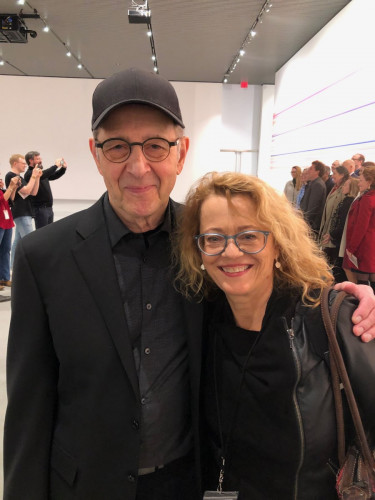
“downtown new york”
Selections from:
In a Landscape, 4’33”, Dream
John Cage
Mad Rush
Philip Glass
Etudes 2, 5, 7, 9
Philip Glass
Ellis Island, Last Song
Meredith Monk
Earring, Compassion, my lips from speaking
Julia Wolfe
Piano Counterpoint
Steve Reich
Piano Piece (for Philip Guston)
Morton Feldman
Piano Piece no.4, Winnsboro Cotton Mill Blues
Frederic Rzewski
(Duration: 50-80 minutes)
Music from Lisa’s CDs including Which Side Are You On? (Rzewski) and The Stone People (Julia Wolfe) (Cantaloupe)
Portraying a riveting sense of the groundbreaking, ‘downtown’ NYC music scene, from the 1940’s to the present day – this program includes works written by the major composers including John Cage’s outrageous 4’33” and Julia Wolfe’s “Compassion”, written in memory of 9/11.
Press
““Lisa Moore gave a startlingly good performance: she was lustrous at the keyboard, and at once engaging and challenging.” — Paul Griffiths, The New York Times May 2015
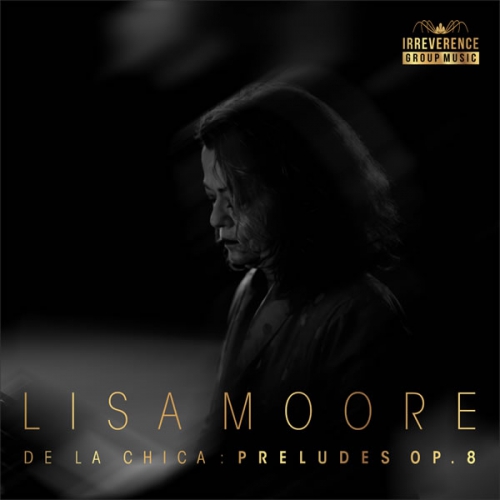
This concert features 13 beautiful, meditative Preludes Op.8 by the Columbian composer Julián de la Chica from Lisa’s recent CD release for piano and synthesizer. Julian de la Chica performs on synthesizer. This concert can be solo piano or piano with synthesizer.
PRESS:
” ‘Prelude No. 7’ has an abandoned 80s fairground vibe with the waltz-like accompaniment in the left hand and the subtle addition of ascending and descending synth passages that float around the melody like an ominous merry-go-round jingle, but from the 80s.” (Rosa Gollan, WNYC New Sounds, for more click here)
“The set of Preludes reveals a distinctive voice, evocative of distant and lost worlds… The playing of Lisa Moore is incredibly evocative … the sounds that she produces from the piano can best be described as achingly beautiful.” (Stephen Mould, Loudmouth/Music Trust for more: click here)
Record Label: Irreverence Group Music
Musical Example Prelude no.13 https://www.youtube.com/watch?v=EGWRFBkeYYI
“the stone people who live in the wind”
TukiliitJohn Luther Adams
Among Red MountainsJohn Luther Adams
NunataksJohn Luther Adams
Sliabh BeaghKate Moore
EarringJulia Wolfe
CompassionJulia Wolfe
OrizzonteMissy Mazzoli
Ishi’s SongMartin Bresnick
(Duration: 80 minutes)
Music from Lisa’s latest CD The Stone People (Cantaloupe)
This recording takes its name from a piece by John Luther Adams. His Tukiliit is subtitled “the stone people who live in the wind,” and Lisa’s decision to focus on Tukiliit became the organizing principle for the rest of this recording. John’s music is ruggedly elemental, using very restrained materials as a way of probing some of our most fundamental human truths. Who we are. Where we are. How we relate to each other. How we relate to the natural world. His pieces are stark explorations of humankind in its most elemental state, and this CD brings together, for the first time, his complete acoustic music for solo piano. The composers on this recording all share these concerns because they are all composer-explorers. Martin Bresnick’s reliquary for a song sung by Ishi, the last surviving member of a Native American tribe, who died without telling anyone what the words meant. Julia Wolfe’s commitment to an elemental human value. Kate Moore’s exploration of her Irish-Australian heritage. Missy Mazzoli’s pursuit of the unattainable horizon. The mysteries echo down through the ages. Who we are. Where we are. How we relate to each other. How we relate to the natural world. – David Lang
Press
“Ms. Moore offered a beautiful performance of Mr. Bresnick’s piece, with the meditative lucidity that is the hallmark of her playing. Perhaps coincidentally, the work illuminates seemly irreconcilable opposites, with alternating major and minor versions of the same chord. Repetitive fragments build up tension until the music abruptly gives way to conciliation. It’s the major mode that wins in the end, but quietly, without triumph” — Corinna da Fonseca-Wollheim, The New York Times May 2015
Mad Rush (1979)
Metamorphosis 1 (1988)
Metamorphosis 2 (1988)
Metamorphosis 4 (1988)
Satyagraha Act III Conclusion (1980)
Closing (1991)
Etude no. 2 (1994) Philip Glass
intermission
For The Sexes: The Gates of Paradise (2001) Martin Bresnick
Text and original imagery by William Blake (1757-1827)
Visual animation by Puppetsweat Theater
(Duration: 90 minutes)
A concert of expansive piano music with a narrative beyond the purely abstract – composed by Philip Glass and Martin Bresnick. (Includes text and DVD projection. Suitable for art galleries and museums).
This concert presents music with roots in motion pictures, opera, Ghandi, Buddhism and William Blake. The opening Mad Rush was written for the Dalai Lama’s dramatic 1981 entrance into St. John the Divine Cathedral, NYC. Metamorphosis I was composed for The Thin Blue Line – a 1988 Errol Morris documentary about Randall Dale Adams who was wrongfully convicted of murdering a police officer and sentenced to death. Metamorphosis II was featured in The Hours – a film based on Virginia Woolf. Satyagraha Act III Conclusion is a 7 minute piano arrangement of the opera’s final scene. “Satyagraha” is Sanskrit for “truth force”. Satyagraha deals with Gandhi’s early years in South Africa and his development of non-violent protest. “Closing” is an arrangement of the larger Music in Twelve Parts finale. The first half closes with Etude no. 2, building rich resonance over a lilting 7/8 – 4/4 rhythm.
Sonata in Eb Hob.52 Joseph Haydn
Sonata Opus 31 no.3 “The Hunt” (1802) Beethoven
Sonata Opus 54 (1804) Beethoven
intermission
De Profundis for speaking pianist (1991) Frederic Rzewski (text: Oscar Wilde)
(Duration: 90 minutes)
A guest in the complete Beethoven piano sonata cycle at the 2017 Canberra International Music Festival Moore presents three master composers for piano in dramatic contrast – Haydn, Beethoven and Rzewski. One Haydn sonata, two Beethoven sonatas and Rzewski’s De Profundis – a dramatic melodrama composed for speaking pianist reciting text by Oscar Wilde – his last work of prose, written while imprisoned in Reading Goal (1897) and set by American composer Frederic Rzewski in 1991 and available on Moore’s Cantaloupe Music CD.
Press
‘Lisa Moore being a woman, her recitation moves Wilde’s words into a slightly more abstract realm than that of Rweski’s…LM’s performance is more lyrical overall…I quickly became fond of Moore’s De Profundis. LM’s performances embrace the written-improvisatory feel of these pieces, though she is more introspective…This is a very enjoyable disc of important repertoire; highly recommended’ — Fanfare Magazine
The complete dramatic piano works by the Moravian Czech master composer Leoš Janàček
In The Mist (1912)
From The Street, Sonata 1.X 1905
On an Overgrown Path (series I & II) (1901-11)
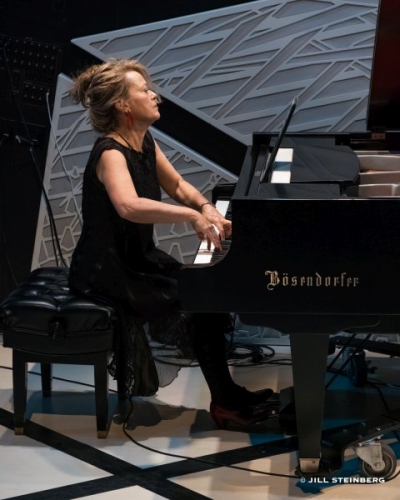
(Duration: 70 minutes)
Works by Leos Janacek from Lisa Moore’s Tall Poppies CD
Press
‘Among my favourite recordings Moore’s Janacek disc sits very easily in their company, indeed it combines the best of approaches, there is a greater rhythmic tension and the piano sound is rich and natural.’ — Andrew Ford, ABC Radio 24 Hours Magazine
Etude Op.2 no.1 (1887)
Prelude Op.11 no.5 (1896)
Prelude Op.27 no.2 (1900)
Prelude Op.33 no.3 (1903)
Prelude Op.48 no.2 (1905)
Prelude Op.51 no.2 (1906)
Prelude Op.74 no.3 (1914) Alexander Scriabin
Sonata – From the Street 1.x.1905 Leos Janacek
Six Dances in Bulgarian Rhythm (1926-1939) Bela Bartok
Satyagraha – Conclusion, Act 3 (1980)Philip Glass
Ishi’s Song (2012) Martin Bresnick
Piano Piece no. 4 (1977) Frederic Rzewski
(Duration: 60 minutes)
Music spanning 120 years of flowing piano music, tinged with “eastern” influences or written by composers with eastern European roots.
Press
“I prefer her interpretation of the Scriabin pieces, all miniatures, where her ability to pounce on the harmonic skeleton and manipulate its melodic muscle makes perfect musical sense. They are all clearly and convincingly projected, passionately powerful” — RealTime Adelaide Festival 2000 Adelaide Town Hall
Earring Julia Wolfe
Compassion Julia Wolfe
Six Etudes and a Dream Hannah Lash
my lips from speaking Julia Wolfe
yeah, yeah, yeah Lois V Vierk
Sensitive Spot Kate Moore
Sliabh Beagh Kate Moore
Julia Bunita Marcus
Orizzonte Missy Mazzoli
Music by women – highlighting who we are, what we do, and how we feel.
Press
“It’s with the six pianos of my lips from speaking (here remarkably performed by Lisa Moore) that Wolfe really pushes things over the edge.” — New Music Box
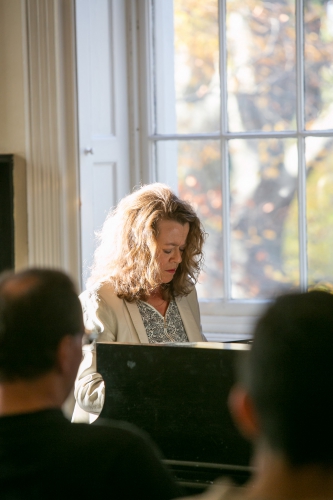
Sonata 1.x.1905 Leos Janàček
Orizzonte Missy Mazzoli
Aus der Tiefen Paul Grabowsky
Ishi’s Song Martin Bresnick
intermission
Prelude and Fugue, B minor Bk 1 J.S. Bach
Sliabh Beagh Kate Moore
Etude no. 2 Philip Glass
Piano Piece no. 4 Frederic Rzewski
(Duration: 75 minutes)
A rich selection of dramatic music for the “piano/forte”
Performance Schedule
Reflets dans l’eauClaude Debussy
Waldscenen Robert Schumann
intermission
Pictures at an Exhibition Modeste Mussorsky
(Duration: 75 minutes)
Ideal for art galleries and museums – music inspired by visual imagery.
Press
‘Dispensing with fireworks in five selections from Schumann’s Waldszenen, Ms. Moore phrased with a breathlike lyricism in the introduction and finale; between those points she showed her capacity for illuminating character, most vividly in a haughty, preening Vogel als Prophet….’ — Steve Smith, The New York Times April 2011
Performance Schedule
Piano Etudes (six etudes from Bk 1 & 2) Gyorgy Ligeti
Musica Ricercate Gyorgy Ligeti
intermission
For the Sexes: The Gates of Paradise Martin Bresnick
(Duration: 90 minutes)
This concert opens with a collection of some of Gyorgy Ligeti’s finest works for piano, followed by American composer Martin Bresnick’s setting of William Blake’s engravings and text with video by Leslie Weinberg.
Press
‘More profound artistically was Martin Bresnick’s touchingly eloquent For The Sexes: The Gates of Paradise. Integral to this piece are the projections behind the piano of 17 of Blake’s engravings, which have been subtly manipulated and sequences by video artist Leslie Weinberg.’ — The Australian July 2001
‘Lisa Moore, an Australian pianist long based in and around New York, has always been a natural, compelling storyteller. Ms. Moore’s steely virtuosity and bold imagination showed equally during commanding accounts of three movements from Gyorgy Ligeti’s Musica Ricercata, followed by three selections from his first book of Études.’ — Steve Smith, New York Times April 2011 link
Performance Schedule
Piano Etudes Bk 2 nos 7-12 Claude Debussy
Piano Etudes Op. 18 Bela Bartok
Piano Etudes (selections Bk 1 & 2) Gyorgy Ligeti
Six Etudes and a Dream Hannah Lash
Etudes no.4 & no.8 Eleonor Sandresky
Seven Etudes Don Byron
Etudes (selected) Philip Glass
(Duration: 75 minutes)
A concert of traditional and new virtuosic piano etudes.
Press
‘One of her signature pieces, Don Byron’s Seven Etudes, puts the pianist through a theater-of-pain demonstration in arrhythmia: pounding out one rhythm with her hands, she sings a series of “la-la-las” completely at odds with the piano. It’s a gripping demonstration.’ — Jayson Greene, Pitchfork Feb 28, 2012
‘Lisa Moore, an Australian pianist long based in and around New York, has always been a natural, compelling storyteller. Ms. Moore’s steely virtuosity and bold imagination showed equally during commanding accounts of three movements from Gyorgy Ligeti’s Musica Ricercata, followed by three selections from his first book of Études.’ — Steve Smith, New York Times April 2011
Sonata in Eb Hob.52 Joseph Haydn
Waldscenen Robert Schumann
In The Mist Leos Janacek
intermission
Pictures at an Exhibition Modeste Mussorgsky
(Duration: 90 minutes)
Press
‘Dispensing with fireworks in five selections from Schumann’s Waldszenen, Ms. Moore phrased with a breathlike lyricism in the introduction and finale; between those points she showed her capacity for illuminating character, most vividly in a haughty, preening Vogel als Prophet.’ — Steve Smith, The New York Times April 2011
Orizzonte Missy Mazzoli
Wed David Lang
Mad Rush Philip Glass
Willie’s Way Martin Bresnick
intermission
Authentic Presence Ingram Marshall
American Berserk John Adams
Second Childhood John Halle
Earring Julia Wolfe
Piano Counterpoint Steve Reich
(Duration: 90 minutes)
Vital, modern American music.
Press
‘Last Saturday the All-Stars’ sensational and sensitive pianist Lisa Moore offered the Janacek Sonata; etudes by Ligeti; Rzewski’s ”Winnsboro Cotton Mill Blues”; Martin Bresnick’s ”The Dream of the Lost Traveller”; and ”Wed,” by one of Bang on a Can’s cofounders, composer David Lang, a lovely, quiet, shimmering piece that is part lullaby, part requiem. Moore herself wore Levis accented by gold lame pumps.’ — Richard Dyer, Boston Globe
Prayer and Equality Brett Dean (text Michael Leunig)
Last Song Meredith Monk (text Meredith Monk)
Zebulon Rufus Wainwright (text Rufus Wainright)
Stur in Dur (Stuck in Major) Elena Kats-Chernin
By This River (arr. Moore) Brian Eno
Ishi’s Song Martin Bresnick
I Think It’s Gonna Rain Randy Newman
(Duration: 70 minutes)
A witty program of music with text featuring classics such as Brett Dean’’s startling Equality, Russian-Australian Elena Kats-Chernin’s cheeky Stur in Dur, Brian Eno’s reflective By This River and a Randy Newman timeless ballad.
Performance Schedule
Lotus Land and Pierrot Triste Cyril Scott
Pour le Piano Claude Debussy
Etudes and Preludes Alexander Scriabin
intermission
De Profundis Frederic Rzewski
(Duration: 70 minutes)
“to love oneself is the beginning of a life long romance” (Wilde)
A dramatic, speaking pianist show that celebrates the turn of the nineteenth century highlighting Moore’s De Profundis recording. Features screened art slides by Monet, Beardsley and Toulouse-Lautrec with Oscar Wilde spoken witticisms and writings, interspersed with English palm court melodies, French precision and Russian romance. The grand finale is Frederic Rzewski’s De Profundis for speaking pianist, a provocative music theater piece that re-works the original text by Oscar Wilde. This compositional tour-de-force makes unheard of demands on the concert pianist: singing, whistling, crying, hitting and scratching.
Press
‘I found Frederic Rzewski’s reworking of Oscar Wilde’s original text for De Profundis, and Moore’s performance of it, intensely moving. In addition to her formidable pianistic skills, she has a beautiful, expressive speaking voice. It allowed her to cover a huge range of vocal delivery from the most tender feelings to almost unbearable screams of anguish. To do this while playing the difficult score was quite remarkable.’ — ARTLOOK Sept 2005
‘The whole is an uneasy amalgam of manic states to which Moore brought utter conviction and riveting virtuosity’ — The Australian Adelaide Festival 2000
‘Moore began her recitation of Wilde’s prose, into which she buried herself with the skill of a trained actress and the rhythmic intuition of a rapper’ — Berkshire Eagle July 2003
Schubert Blues Elena Kats-Chernin
Purple Prelude Elena Kats-Chernin
Variations on a Serious Black Dress Elena Kats-Chernin
intermission
Sonata Lost and Found Elena Kats-Chernin
Rags (selected) Elena Kats-Chernin
(Duration: 70 minutes)
Works by Australian pianist-composer virtuoso Elena Kats-Chernin from Lisa Moore’s Tall Poppies CD Purple, Black and Blues.
Press
‘This Purple Black and Blues disc contains powerfully intense performances. Moore’s playing reveals a total and implicit understanding of its purposes’ — MCA Music Forum
Piano Step Sam Adams
I Move to Keep things Whole Paul Kerekes
Bad Blood Julian Day
Sensitive Spot Kate Moore
intermission
Ceramics Ryan Brown
How Can I Live In Your World of Ideas? Timo Andres
I’m only a narcissist because we have so much in common Bryan Senti
Fast Chords Hannah Lash
(Duration: 75 minutes)
New virtuosic works by young(ish) composers under 40
Press
‘Timothy Andres’s haunting How Can I Live in Your World of Ideas? (2007) starts with a coolly sophisticated line that he punctures with little bursts. Uneasily elegiac, the piece folds in short quotes from Chopin and Mozart without becoming cute or emptily postmodern. It exudes melancholy, a sense of loss.’ — Zachary Woolfe, The New York Times May 29 2011
Barcarolle Frederic Chopin
Ballade no.3 and 4 Frederic Chopin
Sonata in B flat minor Frederic Chopin
Fantasie Impromptu Frederic Chopin
North American Ballads Frederic Rzewski
De Profundis Frederic Rzewski
(Duration: 90 minutes)
Timeless piano music by the two great Frederics.
Press
‘De Profundis, Frederic Rzewski’s tender, magnificently theatrical setting of Oscar Wilde’s letters from the Reading Gaol, is one of the great scores of the 1990s, and it sounds as revelatory as ever in pianist Lisa Moore’s brilliant new recording…Also on the disc are Rzewski’s four “North American Ballads,” and the opening “Dreadful Memories,” in particular, is soft-edged and tender enough to elicit tears.’ — Josh Kosman, San Francisco Chronicle June 2003
‘Blessed with a beautiful speaking voice, her delivery of the actual text (De Profundis) is clear and confronting, often profoundly moving…’ — RealTime (Adelaide Festival 2000)

pic with Frederic Rzewski in Norfolk CT 2008
“my lips from speaking…” * Julia Wolfe
Stainless Staining Donnacha Dennehy
Lightning Slingers and Dead Ringers Annie Gosfield
Sensitive Spot Kate Moore
Piano Counterpoint Steve Reich
(Duration: 60 minutes)
Electric, amplified piano music with samplers, playback, DVD/screen and keyboards.
Press
“Lisa Moore, founding pianist of the Bang on a Can All-Stars, plays both works with mesmerizing command of Dennehy’s simmering soundscapes and finely graded dynamic palette” — Gramophone Nov ’12
“Lisa Moore’s rendition of Annie Gosfield’s Lightning Slingers and Dead Ringers, in its U.S. premiere, (@ the Bang on a Can Marathon) was a tour de force. A layered pastiche that includes prepared-piano, vintage-synthesizer and factory sounds, the jazz-inflected music was anchored by a mechanical continuo that recalled old-time railroad machinery. The combination of grand piano and well-chosen electronic samples created a 21st-century orchestra for a single performer.” — Gail Wein, MusicalAmerica July ’08
Six Etudes and Musica Ricercata Gyorgy Ligeti
intermission
In the Mist Leos Janacek
The Dream of the Lost Traveller Martin Bresnick
Six Dances in Bulgarian Rhythm Bela Bartok
(Duration: 90 minutes)
This program features the music of Bartok, Ligeti, Janacek and Bresnick. Some of the greatest music of our time with Balkan dance rhythms, Eastern-European folk melodies and stirring slavic harmonies.
Press
“Ms. Moore’s steely virtuosity and bold imagination showed equally during commanding accounts of three movements from Gyorgy Ligeti’s Musica Ricercata, followed by three selections from his first book of Études…” — Steve Smith, The New York Times April 2011
Sonata No.10 (Insect) Alexander Scriabin
Etudes/Preludes Alexander Scriabin
intermission
Pictures at an Exhibition Modeste Mussorgsky
(Duration: 90 minutes)
Featuring the great Russian composers Scriabin and Mussorgsky – this program explores the world of Russian decadence, romance and suffering.
Press
‘Suffused throughout with powerful, dense passages of fearsome difficulty, and Moore made it look easy. Moore’s thundering virtuosity – she virtually demolished the piano’s lower register at the end.’ — Seen and Heard Music Web Jan ‘06
American 20th Century Masterpieces
Three Page Sonata Charles Ives
Concord Sonata Charles Ives
Piano Variations Aaron Copland
North American Ballads Frederic Rzewski
Piano Piece no.4 Frederic Rzewski
Willie’s Way Martin Bresnick
Piano Counterpoint Steve Reich
It All Adds Up (selections) Paul Lansky
Mad Rush Philip Glass
Powerful selections from classics in the American 20th and 21st Century piano library.
Press
“Martin Bresnick’s rowdy, sensual Willie’s Way (2006) asked the pianist to slap herself in the face, snap her fingers and beat her lap while playing a dazzling bluesy fantasy on Cream’s cover of Willie Dixon’s ‘Spoonful’.” — Zachary Woolfe, The New York Times
“Paul Lansky’s highly demanding toccata received a performance of breathtaking ease and assurance” — The Canberra Times May ’06
“One of those who undoubtedly maintained a high degree of mastery was the pianist Lisa Moore, guest director of this first Greenway program, a knee-bending, foot-rocking conductor…and an excellent soloist in Charles Ives’s Three-Page Sonata, a work which manages to be visionary, irreverant and genuinely entertaining.” — The Sydney Morning Herald

The Pleasure of Being Lost – a program of American music that celebrate the complexities of time and color
John Luther Adams – Among Red Mountains
Lois V Vierk – Yeah, Yeah, Yeah
Jim Fox – the pleasure of being lost
Peter Garland – Bright Angel/Hermetic Bird – I and II
Michael Byron – New Work (world premiere)
David Mahler – Martin Bartlett at the Claremont Hotel
John Luther Adams – Tukiliit
Mad Rush (1979)
Piano Etudes no.5, 7 and 9
Metamorphosis 1-5 (1988)
Satyagraha Act III Conclusion (1980)
arr. Michael Riesman
Closing (1991)
arr. Lisa Moore
Piano Etude no. 2 (1994)

(Duration: 65 minutes)
The ideal music for reverberant, acoustic spaces such as cathedrals, warehouses, train stations, and art galleries.
Music by Philip Glass from Lisa Moore’s 2015 Mad Rush CD (Orange Mountain Music) presenting music with roots in motion pictures, opera, Ghandi, and Buddhism. Mad Rush was written for the Dalai Lama’s dramatic 1981 entrance into St. John the Divine Cathedral, NYC. Metamorphosis I was composed for The Thin Blue Line – a 1988 Errol Morris documentary about Randall Dale Adams who was wrongfully convicted of murdering a police officer and sentenced to death. Metamorphosis II was featured in The Hours – a film based on Virginia Woolf. Satyagraha Act III Conclusion is a 7 minute piano arrangement of the opera’s final scene. “Satyagraha” is Sanskrit for “truth force”. Satyagraha deals with Gandhi’s early years in South Africa and his development of non-violent protest. “Closing” is a solo arrangement of the Music in Twelve Parts finale. Etude no. 2 completes the concert, building rich resonance over a lilting 7/8 – 4/4 rhythm.
Press
“The memory of Moore’s lucid, luminous performance are all I have left to spin into this tale. This performance needs no aid in finding embedding itself into my memory. I’ve heard some dismiss Glass’ work for its overt simplicity, and piano it would seem to reduce further its already minimal content. But Moore’s playing shaded each repeated scale fragment and every basso thump to rang out among the Old Masters in the Toledo Museum of Art’s Great Gallery” — David Dupont, I Care If You Listen
“This album of piano works by Philip Glass has more life and freshness than the composer’s own recordings, themselves still vital. When “Mad Rush” begins to teem, Ms. Moore’s playing seems to escape the shackles of Glass’s processes. In the shifting chords of “Closing,” lines sing as if in Baroque counterpoint, with a fragility and tenderness that recalls Strauss. The five tableaux of “Metamorphosis,” and an arrangement of the end of “Satyagraha,” are scarcely less diaphanous.” — David Allen, The New York Times June ‘15
****
From Trondheim Norway Aug 2019: “Lisa makes my dice too small”
The piano player visiting Trondheim on Thursday, made the water flow. Not literally, but this was the experience she created.
Words: Maria Veie Sandvik
Water flowed into the cathedral, it was like a dream.
Lisa Moore performed on a podium underneath the main tower, between the northern and southern wing. Despite her considerable international standing, she radiated a humble seriousness. She’s got natural authority, not expressed through posing gestures, but through calmness. Already before her fingers hit the keys, we are focused. The audience sit on chairs that make a lot of sound even by the slightest movement, still the only sound to be heard are occasional suppressed coughs.
The programme of the evening is dedicated to Philip Glass, “the founder of minimalism”, who’s been working cross culturally with icons like Doris Lessing, David Bowie and Woody Allen. Glass himself describes his works as “music with repetitive structure”. In addition to Glass, the audience were treated to “Ishi’s Song” by Martin Bresnick and “Wed” by David Lang.
Swathed in blue light, Moore starts with Glass’ “Etude no. 2”. The first thing that springs to mind is waves, the water flows in, growing in volume and intensity. Even when Moore releases a key, the sound hangs in the air for a long time. It is really, really quiet, not even the squeaking of a chair, only the falling sound of the note.
In the pause before “Metamorphosis I-V”, I move myself to the front row. The light shifts again and gets warmer, from ocean blue to apricot. Are we as an audience being transformed? This year’s Olavsfest impresses, not only through the festival’s choice of artists, but also through how they are presented to the audience. Moore’s playing is ravishing, enchanting, alluring – it’s like we’re all dissolving and become one. And this doesn’t happen through works of dead classic composers, but some that are very much alive. Bresnick is present to hear Moore play «Ishi’s Song». Before Moore sits down by the grand piano, we hear Bresnick tell us about Ishi, who in 1911 was the last survivor of the Yahi tribe of California. Bresnick emphasized how both Ishi and himself had lost the opportunity to speak their native tongue, and described the piece as a requiem for Ishi, but also as a song of healing. What made the piece stand out even further, was that Moore used her own voice, not just the keys on the piano. I got a similar experience from Rossana Mercado-Roja’s performance “Sin Nombre” at the Konst-Tid festival in Åre a few days later. What do you do when you no longer know your native tongue?
Then, the water flows in again, running through Moore’s fingers. It fills the cathedral and lights up the windows. Moore impresses through incredibly precise touches. She’s brilliant, and time and time again I get the feeling she’s gonna leave us – through her sudden and surprising changes, long before the concert ends. Finally she leaves us for real, but we applaud her back and get “Etude no. 7” as a gift in return. With this encore by Glass we also get to hear her hammering the keys, this time with even greater contrast in her approach. It’s like history itself wells out of her piano.
Olavsfest’s festival theme, transformation, turned specific through Moore’s choice of material. Thursday night, Moore gave a voice to both Ishi, Bresnick and countless others.
https://www.adressa.no/pluss/kultur/2019/08/05/Lisa-sprenger-terningen-min-den-blir-for-liten-19635543.ece”
A Global Village Piano

In times of war and dislocation A Global Village Piano brings us together, connecting our lives with music from around the world.
Program:
Sonata Lost and Found (20′) by Elena Kats-Chernin (Russian-Australian)**
Bagatelles Opus 1 (15′) by Valentin Silvestrov (Ukrainian)
Intimate Impressions (21′) by Federico Mompou (Spanish)
Commuter Variations* (19′) by Kate Neal – with animation projections by Sal Cooper (Australian)**
De Profundis for speaking pianist (25′) by Frederic Rzewski (Polish-American) with text by Oscar Wilde (Irish)
**Works commissioned by Lisa Moore
Technical requirements: sound and visual elements required:
Neal: screen, projector, black out
Rzewski: vocal amplification/microphone.
 This program presents classic landmark works and a new composition by pianist-composer Frederic Rzewski (1938-2021) from Moore’s new CD ‘no place to go but around’ on Cantaloupe Music (release date: June 24 2022).
This program presents classic landmark works and a new composition by pianist-composer Frederic Rzewski (1938-2021) from Moore’s new CD ‘no place to go but around’ on Cantaloupe Music (release date: June 24 2022).
Program:
To His Coy Mistress (1988) – text by Andrew Marvel
no place to go but around (1974)
Coming Together (1971)*
Amoramaro (2020)
Piano Piece no.4 (1977)
*requires microphone for voice amplification
This project began with a gift.
Martin Bresnick, my life partner, surprised me for my 60thbirthday with a new piece he had commissioned for me, from Frederic Rzewski. Amoramaro – a soulful, strange, almost haunting piece – was written for me, and is dedicated to me, and by a strange fate it is one of the last works Rzewski wrote. Before I could get a chance to play it in public he was gone.
I met Rzewski in 1992, in Amsterdam. I was a founding member of the Bang on a Can All-Stars, and that night we were performing Coming Together, in our own rollicking version – dividing up and trading off the music and the text amongst the sextet. Rzewski was there and he introduced the work from the stage, his unsmiling, strong profile making him both terrifying and yet amusing and lovable. “Western Civilization has been in decline since the Roman Empire” he deliberated into the microphone. The restless audience fell silent.
That same day, a colleague suggested I approach Rzewski and ask him for the score of De Profundis– his new piece for a speaking pianist, based on the letter by an imprisoned Oscar Wilde. He said I should come see him, and a few months later, I drove to Kingston NY, where he was renting a house, to get the score from him. He generously handed it to me, made me a tuna fish sandwich and we sat and talked in the back garden. He said he used to be a communist, but now he was a nihilist. He told me he didn’t believe in copyright, only copyleft and copywrong. “So make a copy of the score and post the original back to me.”
Rzewski’s declamatory, terse way of speaking was a breath of fresh air to me, (familiar to my own family style). He was a one-off. He didn’t seem to care what people thought of him. He was blunt, matter of fact, frustrating, and brilliant. Yet deep down he was a real ‘mensch’ who cared deeply for humanity. His works had strong underlying, or overlying, messages of social justice. He was a bohemian family man, giving most of his meager income to his children and grandchildren. Personally, when I once thought of quitting piano he encouraged me to keep going – he said “why stop playing? Don’t waste your investment, just do other things too.” We always got along. I worked with him closely on De Profundis and To His Coy Mistress. He said “the playing’s always fine Lisa, but go further to exaggerate the words – you have to be the crazy woman in the attic.”
I have dined out on many of Rzewski’s lines. “The so-called field of contemporary music” is one of his phrases I like to use because it so encapsulates our niche-famous status in this boutique field of new music. He could be outspoken, contrarian, outlandish, and opinionated, and yet humble and surprised, even puzzled, as to why the world found him difficult. Neither of us could win teaching jobs, and once, commiserating over lunch, he said “it’s because we’re both terrorists, Lisa.”
Once we were on a NYC ‘gig’ together for twenty-one pianos conducted by a man who only spoke Italian. Things were getting lost in translation. Rzewski was the only one who could translate for the other twenty of us. We asked him for help. But after a long chat with the conductor, Rzewski turned to us and said “you’re on your own.”
pic (by Martin Bresnick) of Lisa Moore and Frederic Rzewski 2010 @ Yale-Norfolk Summer Festival
 The Commuter Variations
The Commuter Variations
Lisa Moore, piano & voice
This collection of new and recent music explores the piano combined with animation, foley, film, text, song, and minor histrionics – gently constructed around motifs of movement and place. This concert especially celebrates the artistic partnership of the animation artist Sal Cooper and composer Kate Neal. Their collaborative projects have produced whimsical, subtle, and startling performance works. Their The Commuter Variations explores the quirks of daily routes and routines.
Watch the premiere of The Commuter Variations concert here on youtube at Melbourne Recital Center, Aug 7th 2019
Program:
Mayke Nas – Cleaning Instructions
Sal Cooper/Kate Neal – Novel Instrument
Missy Mazzoli – Orizzonte
Gyorgy Ligeti – Arc-en-Ciel
David Lang – wed (animation by Isabela dos Santos)
Martin Bresnick – Bundists (Gyorgy, Robert and me)
Erik Griswold – Danny Boy adrift in the rising tide
Sal Cooper/Kate Neal – The Commuter Variations
Cooper/Neal’s The Commuter Variations was commissioned by Music Makers Melbourne Recital Center for the venue’s 10th Anniversary*.
Danny Boy adrift in the rising tide by Erik Griswold was composed for my ongoing Irish Roots project which delves into the examination of lost Irish heritage.
- *”Artistic Director of Melbourne Recital Centre Marshall Maguire writes: “In 2019, Melbourne Recital commissioned 10 new works for our 10th anniversary. Our intention was to bring artists and audiences together in a celebration of music across a range of styles and genres. And we were delighted that Sal Cooper and Kate Neal were able to create the whimsical, fabulous, thought provoking and beautiful The Commuter Variations for our birthday. Bringing together live performance from the virtuosic Lisa Moore, animation, and a new score, was one of the best gifts we’ve had this year. It was a pleasure to work with all three artists on this project, and I know it will have a rich and long life in concert venues around the world.”
The Commuter Variations image by Sal Cooper
Little Room – Exiles – an Irish-Australian pianodrama
Little Room* — William Gardiner
Danny Boy adrift in the rising tide – Erik Griswold
Stainless Staining** – Donnacha Dennehy (with backing track)
The Commuter Variations*** – Kate Neal/Sal Cooper (animation)
De Profundis – Frederic Rzewski (text Oscar Wilde)
* commissioned by Lisa Moore with funding from the Australia Council
** commissioned by Lisa Moore with funding from the Irish Arts Council
*** commissioned by Melbourne Recital Center
PRESS:
“Moore returned onstage a changed person-outfitted in black, her hair loose, and wearing a lapel microphone to unleash an astonishing performance of Frederic Rzewski’s ‘De Profundis’ for speaking pianist…..Moore’s considerable music theatre skills…..what impressed in all these pieces plus a set of etudes and preludes of Scriabin was Moore’s involved approach and the superb clarity of her playing.”
The Australian (for ‘Wilde’s World’ Adelaide Festival 2000)
“Lisa Moore‘s concert last Sunday afternoon at The Center for New Music drew a standing room only crowd, and those in the audience were treated to an exceptionally well-conceived and performed program of music by living composers…. a large part of her repertoire are pieces for written for piano and voice, which are altogether different from lieder or art songs as the pianist and vocalist are the same. It’s a tricky feat, and one I’ve never seen performed live by a classical pianist, at least like this….De Profundis is a twenty-five minute excursion through the anguish and brilliance of Oscar Wilde’s famous 1895 letter written during his imprisonment for homosexuality. Rzewski’s music captures something fundamental in Wilde’s words, and Moore did both proud, turning in an exhilarating performance, full of fleeting moments instead of approaching it like an epic. When it was over it felt like only a few minutes had passed, and the audience took a moment to let it sink in before giving Moore a sustained, hearty ovation….She followed with Randy Newman’s “I Think It’s Going to Rain Today” as an encore without leaving the stage. It was a suitable, gracious way to end one of the finest programs I’ve attended this year.”
by John Marcher
A Beast in a Jungle
July 2014
“On her most recent album, “The Stone People,” the pianist Lisa Moore sings and plays Martin Bresnick’s hypnotic “Ishi’s Song,” a setting of a chant by the last member of the Yahi, who died in 1916.”
Corinna da Fonseca-Wollheim, The New York Times,
April 3, 2016
(Duration: 75 minutes)[/fusion_text]
The subject is the search for our roots, and within that: distance, estrangement, immigration, travel, place, and change.
The concert features commissioned works composed by Irish-Australian composers – Kate Moore, Kate Neal/Sal Cooper (animation), Erik Griswold, and William Gardiner (the latter with text adapted by Lisa Moore, drawn from poems, novels, diaries and letters). Ambient sound designed by the Australian composer William Gardiner envelops the space between works. This program also features Stainless Staining by Irish composer Donnacha Dennehy (also commissioned by Lisa and featured on her Stainless Staining Cantaloupe CD).
The focal point is De Profundis – a 30 minute dramatic oratorio with music composed and text adapted by Frederic Rzewski from original text by Irish writer Oscar Wilde (excerpted from his 1895 letter “De Profundis” written in Reading Goal while prisoned for homosexual acts). This powerful piano tome is composed for a speaking, whistling, singing, percussive, and emoting pianist./fusion_builder_column_inner]

This concert features 13 beautiful, meditative Preludes Op.8 by the Columbian composer Julián de la Chica from Lisa’s recent CD release for piano and synthesizer. Julian de la Chica performs on synthesizer. This concert can be solo piano or piano with synthesizer.
PRESS:
” ‘Prelude No. 7’ has an abandoned 80s fairground vibe with the waltz-like accompaniment in the left hand and the subtle addition of ascending and descending synth passages that float around the melody like an ominous merry-go-round jingle, but from the 80s.” (Rosa Gollan, WNYC New Sounds, for more click here)
“The set of Preludes reveals a distinctive voice, evocative of distant and lost worlds… The playing of Lisa Moore is incredibly evocative … the sounds that she produces from the piano can best be described as achingly beautiful.” (Stephen Mould, Loudmouth/Music Trust for more: click here)
Record Label: Irreverence Group Music
Musical Example Prelude no.13 https://www.youtube.com/watch?v=EGWRFBkeYYI

Bringing Roses With Her Words
Jerome Kitzke
Ishi’s Song
Martin Bresnick
Intimacy and Resistance
Ted Hearne
Little Room
William Gardiner
Sliabh Beagh
Kate Moore
Equality and Prayer
Brett Dean
(text: Michael Leunig)
De Profundis
Frederic Rzewski
(text: Oscar Wilde)
I Think It’s Going To Rain Today
Randy Newman
(Duration: 90 minutes)
An intimate, personal and poignant concert of music for piano and voice.
Press
‘She followed with Randy Newman’s “I Think It’s Going to Rain Today” as an encore without leaving the stage. It was a suitable, gracious way to end one of the finest programs I’ve attended this year. The audience took a moment to let it sink in before giving Moore a sustained, hearty ovation.’ — A Beast In A Jungle July ‘14 Center for New Music San Francisco
August 2018: “From Me To You” in Extended Play @ City Recital Hall Murray Black writes: “Lisa Moore’s impressive five-part set – the highlight was her compelling performance of Frederic Rzewski’s De Profundis in which Moore sobbed, sighed and spoke from Oscar Wilde’s text while playing the difficult piano part” (The Australian Aug 28, 2018)
“the stone people who live in the wind”
Tukiliit
John Luther Adams
Among Red Mountains
John Luther Adams
Nunataks
John Luther Adams
Sliabh Beagh
Kate Moore
Earring
Julia Wolfe
Compassion
Julia Wolfe
Orizzonte
Missy Mazzoli
Ishi’s Song
Martin Bresnick
(Duration: 80 minutes)
Music from Lisa’s latest CD The Stone People (Cantaloupe)
This recording takes its name from a piece by John Luther Adams. His Tukiliit is subtitled “the stone people who live in the wind,” and Lisa’s decision to focus on Tukiliit became the organizing principle for the rest of this recording. John’s music is ruggedly elemental, using very restrained materials as a way of probing some of our most fundamental human truths. Who we are. Where we are. How we relate to each other. How we relate to the natural world. His pieces are stark explorations of humankind in its most elemental state, and this CD brings together, for the first time, his complete acoustic music for solo piano. The composers on this recording all share these concerns because they are all composer-explorers. Martin Bresnick’s reliquary for a song sung by Ishi, the last surviving member of a Native American tribe, who died without telling anyone what the words meant. Julia Wolfe’s commitment to an elemental human value. Kate Moore’s exploration of her Irish-Australian heritage. Missy Mazzoli’s pursuit of the unattainable horizon. The mysteries echo down through the ages. Who we are. Where we are. How we relate to each other. How we relate to the natural world. – David Lang
Press
“Ms. Moore offered a beautiful performance of Mr. Bresnick’s piece, with the meditative lucidity that is the hallmark of her playing. Perhaps coincidentally, the work illuminates seemly irreconcilable opposites, with alternating major and minor versions of the same chord. Repetitive fragments build up tension until the music abruptly gives way to conciliation. It’s the major mode that wins in the end, but quietly, without triumph” — Corinna da Fonseca-Wollheim, The New York Times May 2015
A Bigger Picture - Beyond Abstraction: Glass & Bresnick - Film Music, William Blake & the Dalai Lama
Mad Rush (1979)
Metamorphosis 1 (1988)
Metamorphosis 2 (1988)
Metamorphosis 4 (1988)
Satyagraha Act III Conclusion (1980)
Closing (1991)
Etude no. 2 (1994)
Philip Glass
intermission
For The Sexes: The Gates of Paradise (2001)
Martin Bresnick
Text and original imagery by William Blake (1757-1827)
Visual animation by Puppetsweat Theater
(Duration: 90 minutes)
A concert of expansive piano music with a narrative beyond the purely abstract – composed by Philip Glass and Martin Bresnick. (Includes text and DVD projection. Suitable for art galleries and museums).
This concert presents music with roots in motion pictures, opera, Ghandi, Buddhism and William Blake. The opening Mad Rush was written for the Dalai Lama’s dramatic 1981 entrance into St. John the Divine Cathedral, NYC. Metamorphosis I was composed for The Thin Blue Line – a 1988 Errol Morris documentary about Randall Dale Adams who was wrongfully convicted of murdering a police officer and sentenced to death. Metamorphosis II was featured in The Hours – a film based on Virginia Woolf. Satyagraha Act III Conclusion is a 7 minute piano arrangement of the opera’s final scene. “Satyagraha” is Sanskrit for “truth force”. Satyagraha deals with Gandhi’s early years in South Africa and his development of non-violent protest. “Closing” is an arrangement of the larger Music in Twelve Parts finale. The first half closes with Etude no. 2, building rich resonance over a lilting 7/8 – 4/4 rhythm.
Sonata in Eb Hob.52 Joseph Haydn
Sonata Opus 31 no.3 “The Hunt” (1802) Beethoven
Sonata Opus 54 (1804) Beethoven
intermission
De Profundis for speaking pianist (1991) Frederic Rzewski (text: Oscar Wilde)
(Duration: 90 minutes)
A guest in the complete Beethoven piano sonata cycle at the 2017 Canberra International Music Festival Moore presents three master composers for piano in dramatic contrast – Haydn, Beethoven and Rzewski. One Haydn sonata, two Beethoven sonatas and Rzewski’s De Profundis – a dramatic melodrama composed for speaking pianist reciting text by Oscar Wilde – his last work of prose, written while imprisoned in Reading Goal (1897) and set by American composer Frederic Rzewski in 1991 and available on Moore’s Cantaloupe Music CD.
Press
‘Lisa Moore being a woman, her recitation moves Wilde’s words into a slightly more abstract realm than that of Rweski’s…LM’s performance is more lyrical overall…I quickly became fond of Moore’s De Profundis. LM’s performances embrace the written-improvisatory feel of these pieces, though she is more introspective…This is a very enjoyable disc of important repertoire; highly recommended’ — Fanfare Magazine
Sonata 1.x.1905 Leoš Janàček
Orizzonte Missy Mazzoli
Aus der Tiefen Paul Grabowsky
Ishi’s Song Martin Bresnick
Prelude and Fugue, B minor Bk 1 J.S. Bach
Sliabh Beagh Kate Moore
Etude no. 2 Philip Glass
Piano Piece no. 4 Frederic Rzewski
(Duration: 75 minutes)
A rich selection of dramatic music for the “piano/forte”
Earring Julia Wolfe
Compassion Julia Wolfe
Six Etudes and a Dream Hannah Lash
my lips from speaking Julia Wolfe
yeah, yeah, yeah Lois V Vierk
Sensitive Spot Kate Moore
Sliabh Beagh Kate Moore
Julia Bunita Marcus
Orizzonte Missy Mazzoli
Music by women – highlighting who we are, what we do, and how we feel.
Press
“It’s with the six pianos of my lips from speaking (here remarkably performed by Lisa Moore) that Wolfe really pushes things over the edge.” — New Music Box
Performance Schedule
Sonata in Eb Hob.52 Joseph Haydn
Waldscenen Robert Schumann
In The Mist Leos Janacek
intermission
Pictures at an Exhibition Modeste Mussorgsky
(Duration: 90 minutes)
Press
‘Dispensing with fireworks in five selections from Schumann’s Waldszenen, Ms. Moore phrased with a breathlike lyricism in the introduction and finale; between those points she showed her capacity for illuminating character, most vividly in a haughty, preening Vogel als Prophet.’ — Steve Smith, The New York Times April 2011
Performance Schedule
Etude Op.2 no.1 (1887)
Prelude Op.11 no.5 (1896)
Prelude Op.27 no.2 (1900)
Prelude Op.33 no.3 (1903)
Prelude Op.48 no.2 (1905)
Prelude Op.51 no.2 (1906)
Prelude Op.74 no.3 (1914) Alexander Scriabin
Sonata – From the Street 1.x.1905 Leos Janacek
Six Dances in Bulgarian Rhythm (1926-1939) Bela Bartok
Satyagraha – Conclusion, Act 3 (1980)Philip Glass
Ishi’s Song (2012) Martin Bresnick
Piano Piece no. 4 (1977) Frederic Rzewski
(Duration: 60 minutes)
Music spanning 120 years of flowing piano music, tinged with “eastern” influences or written by composers with eastern European roots.
Press
“I prefer her interpretation of the Scriabin pieces, all miniatures, where her ability to pounce on the harmonic skeleton and manipulate its melodic muscle makes perfect musical sense. They are all clearly and convincingly projected, passionately powerful” — RealTime Adelaide Festival 2000 Adelaide Town Hall
Performance Schedule
Reflets dans l’eauClaude Debussy
Waldscenen Robert Schumann
intermission
Pictures at an Exhibition Modeste Mussorsky
(Duration: 75 minutes)
Ideal for art galleries and museums – music inspired by visual imagery.
Press
‘Dispensing with fireworks in five selections from Schumann’s Waldszenen, Ms. Moore phrased with a breathlike lyricism in the introduction and finale; between those points she showed her capacity for illuminating character, most vividly in a haughty, preening Vogel als Prophet….’ — Steve Smith, The New York Times April 2011
Performance Schedule
Piano Etudes (six etudes from Bk 1 & 2) Gyorgy Ligeti
Musica Ricercate Gyorgy Ligeti
intermission
For the Sexes: The Gates of Paradise Martin Bresnick
(Duration: 90 minutes)
This concert opens with a collection of some of Gyorgy Ligeti’s finest works for piano, followed by American composer Martin Bresnick’s setting of William Blake’s engravings and text with video by Leslie Weinberg.
Press
‘More profound artistically was Martin Bresnick’s touchingly eloquent For The Sexes: The Gates of Paradise. Integral to this piece are the projections behind the piano of 17 of Blake’s engravings, which have been subtly manipulated and sequences by video artist Leslie Weinberg.’ — The Australian July 2001
‘Lisa Moore, an Australian pianist long based in and around New York, has always been a natural, compelling storyteller. Ms. Moore’s steely virtuosity and bold imagination showed equally during commanding accounts of three movements from Gyorgy Ligeti’s Musica Ricercata, followed by three selections from his first book of Études.’ — Steve Smith, New York Times April 2011 link
Moore’s Tall Poppies program includes works by leading Australian composers
Kate Neal – Commuter Variations*, Novel Instrument
Kate Moore – Sliabh Beagh*
Brett Dean – Equality and Prayer
Erik Griswold – Danny Boy adrift in the rising tide*
Carl Vine – Five Bagatelles
Elena Kats-Chernin – Sonata Lost and Found*
*composed for Lisa Moore
From Lisa’s 2019 Sydney Symphony Solo Piano Series program – a beautiful blend of classical and classic contemporary work.
Etude no 2 (1994) Philip Glass (b.1937)
In the Mists (1912) Leoš Janáček (1854-1928)
Sonata in E flat Major Op.31 no.3 “The Hunt” (1802) Ludwig van Beethoven (1770-1827)
intermission
Waldscenen Op.82 (1851) Robert Schumann (1810-1856)
Ishi’s Song (2012) Martin Bresnick (b.1946)
Piano Piece no.4 (1979) Frederic Rzewski (b.1938)

The complete dramatic piano works by the Moravian Czech master composer Leoš Janàček
In The Mist (1912)
From The Street, Sonata 1.X 1905
On an Overgrown Path (series I & II) (1901-11)
(Duration: 70 minutes)
Works by Leos Janacek from Lisa Moore’s Tall Poppies CD
Press
‘Among my favourite recordings Moore’s Janacek disc sits very easily in their company, indeed it combines the best of approaches, there is a greater rhythmic tension and the piano sound is rich and natural.’ — Andrew Ford, ABC Radio 24 Hours Magazine

“downtown new york”
Selections from:
In a Landscape, 4’33”, Dream
John Cage
Mad Rush
Philip Glass
Etudes 2, 5, 7, 9
Philip Glass
Ellis Island, Last Song
Meredith Monk
Earring, Compassion, my lips from speaking
Julia Wolfe
Piano Counterpoint
Steve Reich
Piano Piece (for Philip Guston)
Morton Feldman
Piano Piece no.4, Winnsboro Cotton Mill Blues
Frederic Rzewski
(Duration: 50-80 minutes)
Music from Lisa’s CDs including Which Side Are You On? (Rzewski) and The Stone People (Julia Wolfe) (Cantaloupe)
Portraying a riveting sense of the groundbreaking, ‘downtown’ NYC music scene, from the 1940’s to the present day – this program includes works written by the major composers including John Cage’s outrageous 4’33” and Julia Wolfe’s “Compassion”, written in memory of 9/11.
Press
““Lisa Moore gave a startlingly good performance: she was lustrous at the keyboard, and at once engaging and challenging.” — Paul Griffiths, The New York Times May 2015
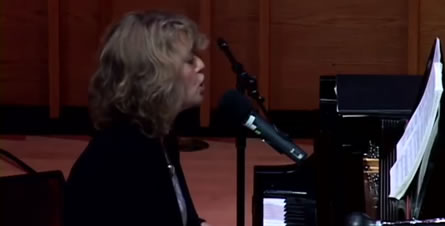
A dramatic evening of theatrics and music for a speaking, acting, singing pianist – featuring the texts of William Blake and Oscar Wilde
To His Coy Mistress by Frederic Rzewski (text by Andrew Marvel) 5′
For The Sexes: The Gates of Paradise by Martin Bresnick
text and (projected) etched images by William Blake (from The Disasters of War) 31′
De Profundis by Frederic Rzewski
text by Oscar Wilde (excerpted from his 1895 letter written in prison to Lord Alfred Douglas) 29′
Program length 65′
Tech: screen, blackout, projections, PA/mic
‘More profound artistically was Martin Bresnick’s touchingly eloquent For The Sexes: The Gates of Paradise. Integral to this piece are the projections behind the piano of 17 of Blake’s engravings, which have been subtly manipulated and sequences by video artist Leslie Weinberg.’ — The Australian July 2001
“Moore returned onstage a changed person-outfitted in black, her hair loose, and wearing a lapel microphone to unleash an astonishing performance of Frederic Rzewski’s ‘De Profundis’ for speaking pianist…..Moore’s considerable music theatre skills…..what impressed in all these pieces plus a set of etudes and preludes of Scriabin was Moore’s involved approach and the superb clarity of her playing.”
The Australian (for ‘Wilde’s World’ Adelaide Festival 2000)
“Lisa Moore‘s concert last Sunday afternoon at The Center for New Music drew a standing room only crowd, and those in the audience were treated to an exceptionally well-conceived and performed program of music by living composers…. a large part of her repertoire are pieces for written for piano and voice, which are altogether different from lieder or art songs as the pianist and vocalist are the same. It’s a tricky feat, and one I’ve never seen performed live by a classical pianist, at least like this….De Profundis is a twenty-five minute excursion through the anguish and brilliance of Oscar Wilde’s famous 1895 letter written during his imprisonment for homosexuality. Rzewski’s music captures something fundamental in Wilde’s words, and Moore did both proud, turning in an exhilarating performance, full of fleeting moments instead of approaching it like an epic. When it was over it felt like only a few minutes had passed, and the audience took a moment to let it sink in before giving Moore a sustained, hearty ovation….She followed with Randy Newman’s “I Think It’s Going to Rain Today” as an encore without leaving the stage. It was a suitable, gracious way to end one of the finest programs I’ve attended this year.”
by John Marcher
A Beast in a Jungle
July 2014
Piano Etudes Bk 2 nos 7-12 Claude Debussy
Piano Etudes Op. 18 Bela Bartok
Piano Etudes (selections Bk 1 & 2) Gyorgy Ligeti
Six Etudes and a Dream Hannah Lash
Etudes no.4 & no.8 Eleonor Sandresky
Seven Etudes Don Byron
Etudes (selected) Philip Glass
(Duration: 75 minutes)
A concert of traditional and new virtuosic piano etudes.
Press
‘One of her signature pieces, Don Byron’s Seven Etudes, puts the pianist through a theater-of-pain demonstration in arrhythmia: pounding out one rhythm with her hands, she sings a series of “la-la-las” completely at odds with the piano. It’s a gripping demonstration.’ — Jayson Greene, Pitchfork Feb 28, 2012
‘Lisa Moore, an Australian pianist long based in and around New York, has always been a natural, compelling storyteller. Ms. Moore’s steely virtuosity and bold imagination showed equally during commanding accounts of three movements from Gyorgy Ligeti’s Musica Ricercata, followed by three selections from his first book of Études.’ — Steve Smith, New York Times April 2011
Schubert Blues Elena Kats-Chernin
Purple Prelude Elena Kats-Chernin
Variations on a Serious Black Dress Elena Kats-Chernin
intermission
Sonata Lost and Found Elena Kats-Chernin
Rags (selected) Elena Kats-Chernin
(Duration: 70 minutes)
Works by Australian pianist-composer virtuoso Elena Kats-Chernin from Lisa Moore’s Tall Poppies CD Purple, Black and Blues.
Press
‘This Purple Black and Blues disc contains powerfully intense performances. Moore’s playing reveals a total and implicit understanding of its purposes’ — MCA Music Forum
Sonata No.10 (Insect) Alexander Scriabin
Etudes/Preludes Alexander Scriabin
intermission
Pictures at an Exhibition Modeste Mussorgsky
(Duration: 90 minutes)
Featuring the music of the great Russian composers Scriabin and Mussorgsky this program explores the world of Russian decadence, romance and suffering.
Press
‘Suffused throughout with powerful, dense passages of fearsome difficulty, and Moore made it look easy. Moore’s thundering virtuosity – she virtually demolished the piano’s lower register at the end.’ — Seen and Heard Music Web Jan ‘06
New American Music
Orizzonte Missy Mazzoli
Wed David Lang
Mad Rush Philip Glass
Willie’s Way Martin Bresnick
intermission
Authentic Presence Ingram Marshall
American Berserk John Adams
Second Childhood John Halle
Earring Julia Wolfe
Piano Counterpoint Steve Reich
(Duration: 90 minutes)
Vital, modern American music.
Press
‘Last Saturday the All-Stars’ sensational and sensitive pianist Lisa Moore offered the Janacek Sonata; etudes by Ligeti; Rzewski’s ”Winnsboro Cotton Mill Blues”; Martin Bresnick’s ”The Dream of the Lost Traveller”; and ”Wed,” by one of Bang on a Can’s cofounders, composer David Lang, a lovely, quiet, shimmering piece that is part lullaby, part requiem. Moore herself wore Levis accented by gold lame pumps.’ — Richard Dyer, Boston Globe
Repertoire from the following list:
Barcarolle Frederic Chopin
Ballade no.3 and 4 Frederic Chopin
Sonata in B flat minor Frederic Chopin
Fantasie Impromptu Frederic Chopin
North American Ballads Frederic Rzewski
De Profundis Frederic Rzewski
(Duration: 90 minutes)
Timeless piano music by the two great Frederics.
Press
‘De Profundis, Frederic Rzewski’s tender, magnificently theatrical setting of Oscar Wilde’s letters from the Reading Gaol, is one of the great scores of the 1990s, and it sounds as revelatory as ever in pianist Lisa Moore’s brilliant new recording…Also on the disc are Rzewski’s four “North American Ballads,” and the opening “Dreadful Memories,” in particular, is soft-edged and tender enough to elicit tears.’ — Josh Kosman, San Francisco Chronicle June 2003
‘Blessed with a beautiful speaking voice, her delivery of the actual text (De Profundis) is clear and confronting, often profoundly moving…’ — RealTime (Adelaide Festival 2000)

pic with Frederic Rzewski in Norfolk CT 2008
Prayer and Equality Brett Dean (text Michael Leunig)
Last Song Meredith Monk (text Meredith Monk)
Zebulon Rufus Wainwright (text Rufus Wainright)
Stur in Dur (Stuck in Major) Elena Kats-Chernin
By This River (arr. Moore) Brian Eno
Ishi’s Song Martin Bresnick
I Think It’s Gonna Rain Randy Newman
(Duration: 70 minutes)
A witty program of music with text featuring classics such as Brett Dean’’s startling Equality, Russian-Australian Elena Kats-Chernin’s cheeky Stur in Dur, Brian Eno’s reflective By This River and a Randy Newman timeless ballad.
Performance Schedule
Piano Step Sam Adams
I Move to Keep things Whole Paul Kerekes
Bad Blood Julian Day
Sensitive Spot Kate Moore
intermission
Ceramics Ryan Brown
How Can I Live In Your World of Ideas? Timo Andres
I’m only a narcissist because we have so much in common Bryan Senti
Fast Chords Hannah Lash
(Duration: 75 minutes)
New virtuosic works by young(ish) composers under 40
Press
‘Timothy Andres’s haunting How Can I Live in Your World of Ideas? (2007) starts with a coolly sophisticated line that he punctures with little bursts. Uneasily elegiac, the piece folds in short quotes from Chopin and Mozart without becoming cute or emptily postmodern. It exudes melancholy, a sense of loss.’ — Zachary Woolfe, The New York Times May 29 2011
“my lips from speaking…” * Julia Wolfe
Stainless Staining Donnacha Dennehy
Lightning Slingers and Dead Ringers Annie Gosfield
Sensitive Spot Kate Moore
Piano Counterpoint Steve Reich
(Duration: 60 minutes)
Electric, amplified piano music with samplers, playback, DVD/screen and keyboards.
Press
“Lisa Moore, founding pianist of the Bang on a Can All-Stars, plays both works with mesmerizing command of Dennehy’s simmering soundscapes and finely graded dynamic palette” — Gramophone Nov ’12
“Lisa Moore’s rendition of Annie Gosfield’s Lightning Slingers and Dead Ringers, in its U.S. premiere, (@ the Bang on a Can Marathon) was a tour de force. A layered pastiche that includes prepared-piano, vintage-synthesizer and factory sounds, the jazz-inflected music was anchored by a mechanical continuo that recalled old-time railroad machinery. The combination of grand piano and well-chosen electronic samples created a 21st-century orchestra for a single performer.” — Gail Wein, MusicalAmerica July ’08
Lotus Land and Pierrot Triste Cyril Scott
Pour le Piano Claude Debussy
Etudes and Preludes Alexander Scriabin
intermission
De Profundis Frederic Rzewski
(Duration: 70 minutes)
“to love oneself is the beginning of a life long romance” (Wilde)
A dramatic, speaking pianist show that celebrates the turn of the nineteenth century highlighting Moore’s De Profundis recording. Features screened art slides by Monet, Beardsley and Toulouse-Lautrec with Oscar Wilde spoken witticisms and writings, interspersed with English palm court melodies, French precision and Russian romance. The grand finale is Frederic Rzewski’s De Profundis for speaking pianist, a provocative music theater piece that re-works the original text by Oscar Wilde. This compositional tour-de-force makes unheard of demands on the concert pianist: singing, whistling, crying, hitting and scratching.
Press
‘I found Frederic Rzewski’s reworking of Oscar Wilde’s original text for De Profundis, and Moore’s performance of it, intensely moving. In addition to her formidable pianistic skills, she has a beautiful, expressive speaking voice. It allowed her to cover a huge range of vocal delivery from the most tender feelings to almost unbearable screams of anguish. To do this while playing the difficult score was quite remarkable.’ — ARTLOOK Sept 2005
‘The whole is an uneasy amalgam of manic states to which Moore brought utter conviction and riveting virtuosity’ — The Australian Adelaide Festival 2000
‘Moore began her recitation of Wilde’s prose, into which she buried herself with the skill of a trained actress and the rhythmic intuition of a rapper’ — Berkshire Eagle July 2003
Six Etudes and Musica Ricercata Gyorgy Ligeti
intermission
In the Mist Leos Janacek
The Dream of the Lost Traveller Martin Bresnick
Six Dances in Bulgarian Rhythm Bela Bartok
(Duration: 90 minutes)
This program features the music of Bartok, Ligeti, Janacek and Bresnick. Some of the greatest music of our time with Balkan dance rhythms, Eastern-European folk melodies and stirring slavic harmonies.
Press
“Ms. Moore’s steely virtuosity and bold imagination showed equally during commanding accounts of three movements from Gyorgy Ligeti’s Musica Ricercata, followed by three selections from his first book of Études…” — Steve Smith, The New York Times April 2011
American 20th Century Masterworks
Three Page Sonata Charles Ives
Concord Sonata Charles Ives
Piano Variations Aaron Copland
North American Ballads Frederic Rzewski
Piano Piece no.4 Frederic Rzewski
Willie’s Way Martin Bresnick
Piano Counterpoint Steve Reich
It All Adds Up (selections) Paul Lansky
Mad Rush Philip Glass
Powerful selections from classics in the American 20th and 21st Century piano library.
Press
“Martin Bresnick’s rowdy, sensual Willie’s Way (2006) asked the pianist to slap herself in the face, snap her fingers and beat her lap while playing a dazzling bluesy fantasy on Cream’s cover of Willie Dixon’s ‘Spoonful’.” — Zachary Woolfe, The New York Times
“Paul Lansky’s highly demanding toccata received a performance of breathtaking ease and assurance” — The Canberra Times May ’06
“One of those who undoubtedly maintained a high degree of mastery was the pianist Lisa Moore, guest director of this first Greenway program, a knee-bending, foot-rocking conductor…and an excellent soloist in Charles Ives’s Three-Page Sonata, a work which manages to be visionary, irreverant and genuinely entertaining.” — The Sydney Morning Herald

The Pleasure of Being Lost – a program of American music that celebrates time and color
John Luther Adams – Among Red Mountains
Lois V Vierk – Yeah, Yeah, Yeah
Jim Fox – the pleasure of being lost
Peter Garland – Bright Angel/Hermetic Bird – I and II
Michael Byron – New Work (world premiere)
David Mahler – Martin Bartlett at the Claremont Hotel
John Luther Adams – Tukiliit


